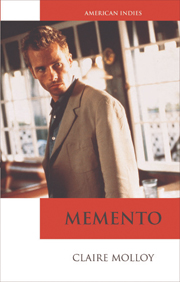Book contents
- Frontmatter
- Contents
- Series Preface
- Acknowledgements
- Dedication
- Introduction: Memento
- 1 Memento and Independent Cinema: A Seductive Business
- 2 Searching for a Slam Dunk: Marketing Memento
- 3 Puzzle Films, Ambiguity and Technologically-enabled Narrative
- 4 Memento as Noir
- 5 So What Really Happened? Memento, Fans and Online Interpretive Strategies
- Notes
- Bibliography
- Index
Introduction: Memento
Published online by Cambridge University Press: 05 August 2013
- Frontmatter
- Contents
- Series Preface
- Acknowledgements
- Dedication
- Introduction: Memento
- 1 Memento and Independent Cinema: A Seductive Business
- 2 Searching for a Slam Dunk: Marketing Memento
- 3 Puzzle Films, Ambiguity and Technologically-enabled Narrative
- 4 Memento as Noir
- 5 So What Really Happened? Memento, Fans and Online Interpretive Strategies
- Notes
- Bibliography
- Index
Summary
Memento emerged into the new landscape of twenty-first-century independent film. As the dust settled on the twentieth century, the corporate and independent sectors had blurred into new entities which raised questions about what independent film had become. On one level Memento sat comfortably within one definition of late twentieth-century independence. Produced and distributed by Newmarket, in financial terms the film occupied the low-budget end of the production spectrum with an initial cost of $5 million. In formal terms Memento's innovative and challenging narrative structure added to its independent credentials, fitting the mould of the off-beat film which would never have been made in a Hollywood system that shied away from such narrative experimentation. At the Sundance Film Festival in 2001, however, critics questioned the film's independence, pointing out that the producers, Jennifer Todd and Suzanne Todd, had a commercial pedigree garnered from films such as Austin Powers: International Man of Mystery (Roach, 1997), Austin Powers: The Spy Who Shagged Me (Roach, 1999) and G.I. Jane (Scott, 1997). Elsewhere the independent sensibility of Memento was challenged, with the film described as being oriented towards a mass commercial audience. In this sense, ‘independence’ was compromised by an association with the mainstream and questions about Memento's ‘indie’ qualifications served to illustrate the complex and contentious terrain of contemporary American independent cinema.
- Type
- Chapter
- Information
- Memento , pp. 1 - 7Publisher: Edinburgh University PressPrint publication year: 2010



